

When the Moors Ruled in Europe. Join British historian Bettany Hughes as she examines a long-buried chapter of European history--the rise and fall of Islamic culture in what is now Spain and Portugal.
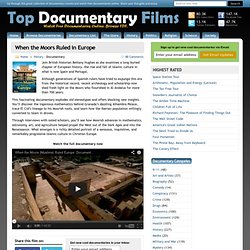
Although generations of Spanish rulers have tried to expunge this era from the historical record, recent archeology and scholarship now shed fresh light on the Moors who flourished in Al-Andalus for more than 700 years. This fascinating documentary explodes old stereotypes and offers shocking new insights. You’ll discover the ingenious mathematics behind Granada’s dazzling Alhambra Palace, trace El Cid’s lineage to his Moorish roots, and learn how the Iberian population willingly converted to Islam in droves. Through interviews with noted scholars, you’ll see how Moorish advances in mathematics, astronomy, art, and agriculture helped propel the West out of the Dark Ages and into the Renaissance. The Templar Code. For nearly two centuries, the Knights Templar was the most powerful order in the medieval world.
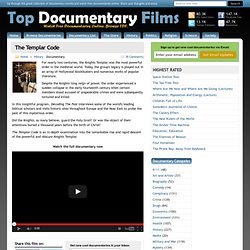
Today, the group's legacy is played out in an array of Hollywood blockbusters and numerous works of popular literature. Barbarians. They were the dreaded forces on the fringes of civilization, the bloodthirsty warriors who defied the Roman legions and terrorized the people of Europe.
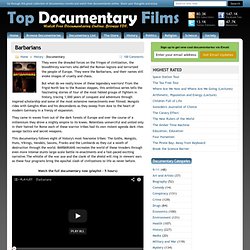
They were the Barbarians, and their names still evoke images of cruelty and chaos. But what do we really know of these legendary warriors? From the frigid North Sea to the Russian steppes, this ambitious series tells the fascinating stories of four of the most fabled groups of fighters in history, tracing 1,000 years of conquest and adventure through inspired scholarship and some of the most extensive reenactments ever filmed.
Mongols rides with Genghis Khan and his descendants as they sweep from Asia to the heart of modern Germany in a frenzy of expansion. Provos, Loyalists and Brits. A trilogy of Documentary Series on Northern Ireland Conflict - Provos, Loyalists and Brits.
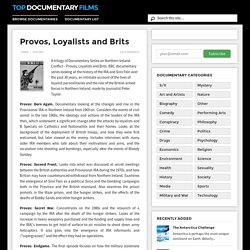
Seven Ages of Britain. Seven Ages of Britain is a BBC television documentary series which is written and presented by David Dimbleby.
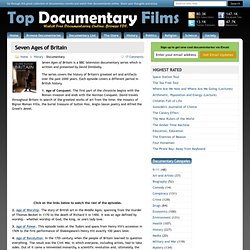
The series covers the history of Britain's greatest art and artifacts over the past 2000 years. Each episode covers a different period in British history. 1. A History of Britain. Stretching from the Stone Age to the year 2000, Simon Schama's Complete History of Britain does not pretend to be a definitive chronicle of the turbulent events which buffeted and shaped the British Isles.
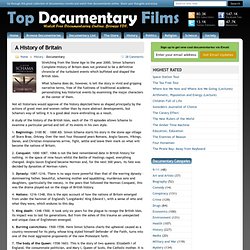
What Schama does do, however, is tell the story in vivid and gripping narrative terms, free of the fustiness of traditional academe, personalizing key historical events by examining the major characters at the center of them. Not all historians would approve of the history depicted here as shaped principally by the actions of great men and women rather than by more abstract developments, but Schama's way of telling it is a good deal more enthralling as a result. A History of Scotland. Landmark documentary series presented by Neil Oliver.
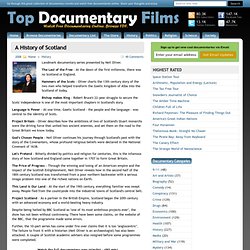
The Last of the Free - At the dawn of the first millennia, there was no Scotland or England. Hammers of the Scots - Oliver charts the 13th century story of the two men who helped transform the Gaelic kingdom of Alba into the Scotland of today. Bishop makes King - Robert Bruce's 22-year struggle to secure the Scots' independence is one of the most important chapters in Scotland's story. The Six Wives of Henry VIII. Queen, lover, mother, outcast, victim and survivor - this is how historian and series narrator David Starkey assigns the roles of the six wives of Britain's most famous monarch Henry VIII in the sexual intrigue and cut-throat power politics of his long reign from 1509 to 1547.
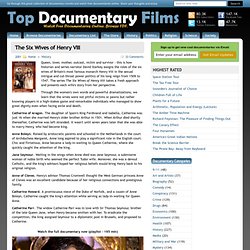
The series The Six Wives of Henry VIII takes a fresh approach and presents each wife's story from her perspective. Through the women's own words and powerful dramatizations, we learn that the wives were not pitiful victims or pawns but rather knowing players in a high-stakes game and remarkable individuals who managed to show great dignity even when facing exile and death.
Catherine of Aragon. The daughter of Spain's King Ferdinand and Isabella, Catherine was just 16 when she married Henry's older brother Arthur in 1501. When Arthur died shortly thereafter, Catherine was left stranded. Anne Boleyn. Jane Seymour. Anne of Cleves. Catherine Howard. Catherine Parr.